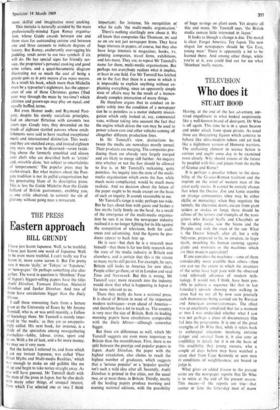Eastern approach
THE PRESS BILL GRUNDY
I have just learnt Japanese. Well, to be truthful, I have just learnt one word of Japanese. Well,
to be even more truthful, I can't really say I've learnt it; more came across it. But I'm pretty sure it means 'daily,' or 'Tokyo,' or 'Japanese,' or 'newspaper.' Or perhaps something else alto- gether. The word in question is `Shimbun.' Four of Japan's biggest-selling papers have the titles Asahi Shimbun, Yomium Shimbun, Mainichi Shimbun and Sankel Shimbun. And two of them have circulations bigger than the Daily
Mirror. •
I cull these interesting facts from a lecture given at the University of Essex by Mr Jeremy Tunstall, who is, or was until recently, a Fellow of gociology there. Mr Tunstall is mainly inter- ested in 'the media,' as they are so unappetis- ingly called. His next book, for instance, is a study of the specialists among newsgathering Journalists—lobby, labour, crime, sport and so on. With a bit of luck, and a bit more money, We may see it very soon.
But the lecture I referred to, and from which I got my instant Japanese, was called 'Fleet Street Myths and Multi-media Realities,' which Was enough to make an old gullible like me Sit up and begin to take notice straight away. As You will have guessed, Mr Tunstall deals with the state of the press in Japan, but he also deals With many other things, of unequal interest, from which I've selected one or two I think
important : for instance, his recognition of what he calls 'the multi-media organisation.'
There's nothing startlingly new about it. We all know that companies like Thomson, IPC and so on are not just newspaper firms. They have huge interests in papers, of course, but they also have large interests in magazines, books, rv, printing companies, travel firms, exhibitions, and lots more. They are, to repeat Mr Tunstall's name for them, multi-media organisations. But perhaps not everybody realises what it implies, at least in one field. For Mr Tunstajl has latched on to the fact that there is a sense in which it is impossible to explain anything without ex- plaining everything, since an apparently simple state of affairs may be the result of a tremen- dously complex interaction, of many things.
He therefore argues that to conduct an in- quiry solely into the condition of a newspaper can be as pointless as a motor industry investi- gation which only looked at, say, commercial vans, without taking into account the fact that the engine which drives the van may be used to power saloon cars and other vehicles coming off altogether different production lines.
In Mr Tunstall's view, distinctions be- tween the media are nowadays mostly unreal. Their products are merging. The companies pro- ducing them are already very largely merged and are likely to merge still further. An inquiry into whether or not the Sun should be allowed to live is, in Mr Tunstall's reckoning, quite pointless. An inquiry into the state of the multi- media organisation which owns the Sun, while much more complicated, would be much more realistic. And no decision about the future of the paper ought to be made except on the basis of such an inquiry. It sounds reasonable to me.
Mr Tunstall's range is wide; perhaps too wide. But he lays about him with gusto and bashes a few myths fairly firmly on the head. As a result of the emergence of the multi-media organisa- tion he sees it as time the newspaper industry realised it is no longer fighting for its life against the competition of television, both for audi- ences and advertising. And the figures he pro- duces appear to back him up.
He is sure—but then he is a research man himself—that there is far too little research into the state of the media industry in Britain and elsewhere, and is certain that this is the reason so many myths still persist. For example, he says, Britain still looks to America for new ideas. People either go there, or sit in London and read Time and Newsweek. But this is wrong, Mr Tunstall says; more research into the industry would show that what is happening in Japan is far more relevant to us.
There they really do have a national press. It is ahead of Britain in most of the important modern techniques—even ahead of America— and therefore has a lot to teach us. The country is very near the size of Britain. Both its leading morning papers have circulations comparable with the Daily Mirror—although somewhat bigger.
But there are differences as well, which Mr Tunstall suggests are even more important to Britain than the resemblances. First, there is no split between the prestige and popular papers in Japan. Asahi Shimbun, the paper with the highest circulation, also claims to reach the highest number of graduates, which suggests that a 'serious popular' or a 'popular quality' isn't such a wild idea after all. Secondly, Asahi Shimbun is printed in five cities, not the usual two, or at most three, in Britain. Thirdly, nearly all the leading papers produce morning and evening national editions, with the possibility
of huge savings on plant costs. Yet despite all this and more, Mr Tunstall says, 'the British media remain little interested in Japan.' It looks as though a change is due. The moral is clear. Forget America. Try Japan. The new slogan for newspapers should be 'Go East, young man.' There is apparently a lot to be learned there. And among other things, while you're at it, you could find out for me what Shimbun' really means.


































 Previous page
Previous page